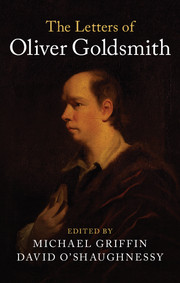20 - To John Bindley, [London, early July 1766]
Summary
John Bindley (c. 1735–86) of Whitefriars, London, and Caversham, near Reading, started in business with his father as a distiller; upon becoming secretary to the Board of Excise, he made his share of the business over to his brother James. He was appointed commissioner of the Excise by the Earl of Bute, who was then prime minister, in February 1763. A friend of Charles Townshend (1725–67), politician, Bindley sought a seat in Parliament in 1764; he was returned on the government interest on 23 December 1766 as MP for Dover. In the general election of 1768, Bindley stood for Reading but was defeated. His financial situation deteriorated and he was bankrupt within a couple of years. In an obituary for his brother James in 1818 in the Gentleman's Magazine, it was recorded that John Bindley ‘had great talents, with a vivacious turn of mind, and united a peculiar aptitude for financial concerns to an ease and pleasantness of conversation, which, in his progress through life, obtained for him many friends’. The friendship between Goldsmith and the Bindleys seems new, and the tone in the letters to John is familiar and giddily ironic.
The two letters to Bindley were written in July 1766. The second letter is at the end dated 12 July by Goldsmith. It is likely that very little time elapsed between the two letters. Balderston reconstructs the letters’ contexts as follows: Goldsmith may have visited Bindley's new home – its newness to the Bindleys might explain the many references to thatching and cultivation – in mid-to-late June, before attending a social gathering at Dr George Fordyce's house on Monday 23 June where Bindley's absence was lamented (it may have been Fordyce who introduced Goldsmith to Bindley in the first instance). During the week following, Goldsmith misdirected a letter to Bindley at West hatch, and the mistaken name of the location becomes a running – not to say tedious – joke in the letter. Bindley may have written to Goldsmith in the meantime asking about the authorship of A History of the Late Minority, a new edition of which had been advertised for 29 June 1766 in the Gentleman's Magazine (36, 288).
- Type
- Chapter
- Information
- The Letters of Oliver Goldsmith , pp. 59 - 63Publisher: Cambridge University PressPrint publication year: 2018



